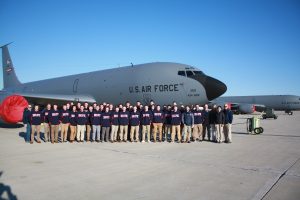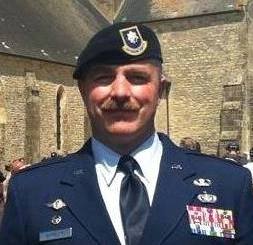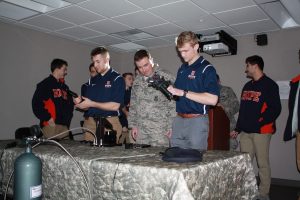As their bus pulled into Grissom Air Force Base, through the fence barrier and approved at the guard post, members of the Hope College baseball team could not help but feel a sense of real wonder. Before them, upon acres and acres of practical Midwest land, stood an operational military base with miles of runways and dozens of no-frills buildings. Airmen saluted and marked military vehicles whizzed by. Large aircraft stood in august readiness in the distance.
If it wasn’t blatantly clear to 31 Hope baseball players on board that bus prior to entering the base, it was now: This was not a typical team trip.

The stopover at Grissom was unique, yes, but not unexpected. It was an excursion arranged weeks earlier by Hope Coach Stu Fritz and Hope alum, Lieutenant Colonel Matt Garvelink ‘96. The Flying Dutchmen were on their way to play Hanover College on the second Saturday of March, and Grissom AFB is on the way, right off US31 in Peru, Indiana. For the past two years, Garvelink has invited the Hope team to stop in and visit the place where he’s been stationed since 2015. Together with Garvelink and other military personnel on base, the baseball players eat a meal in the dining hall, then sit a spell and learn how a national team practices tenacity, commitment, accountability, trust, loyalty, and leadership for the sake of others.
Is there a better place to hear about large-scale dedication to tenacity, commitment, accountability, trust, loyalty, and leadership?
Is there a better place to hear about large-scale dedication to those values? With each visit the Hope baseball team has made to Grissom, transformational lessons unfold into a transformational experience.
“For me, being on base reminds me that a lot of times in life, there are things so much bigger than baseball,” says senior captain Danny Carrasco, a business major from Grandville, Michigan (Calvin Christian HS). “Right now, I think the biggest thing in a lot of our lives is baseball, and we have this commitment to it and we all work really hard at it. But then we see what Lieutenant Colonel Garvelink does, what his team does, and how they are committed to a bigger, greater cause. I would say that we can translate that idea to playing baseball, but better than that, we can translate that into our lives in general.”
Like Carrasco, senior captain Landon Brower of Holland, Michigan (Holland Christian HS), has learned Grissom lessons for baseball and life. A biochemistry/molecular chemistry major, Brower has plans to enter dental school after graduation. He admits his life trajectory has been singularly focused; he’s never considered any other educational or career path. “But then I hear Lieutenant Colonel Garvelink’s story and I’m impacted by being with people who take different pathways and have so much success in different life experiences,” Brower reflects.

Garvelink’s story is a compelling one, a tale of following a calling to a military career only after obtaining a bachelor’s degree from Hope in biology with secondary education certification. Garvelink, who grew up in Holland, Michigan, taught for a year as a substitute teacher after graduation, but he felt a new nudge toward a totally different direction. So he enrolled in and graduated from Grand Valley State University with a degree in criminal justice and then entered Air Force Officer Training School in 2002, graduating as a second lieutenant. Airborne School came next at Fort Benning in Columbus, Georgia. Since then, Garvelink has trained with the Royal Air Force (RAF) in Great Britain, worked contingency response ops out of Germany, been deployed to Iraq five times since 2004, and served in every country in NATO.
“If you had asked me when I was at Hope if I was going to end up in the Air Force, I would have told you it was not even on my radar,” he says without a hint of irony directed at his metaphorical language. “It has been a fulfilling career.”
“Coach Fritz was an early example for me of a leader who really cared for his people. He treated me as an equal part of the team.”
Garvelink and Fritz’s longtime friendship started during the head coach’s first two seasons and the alum’s last two springs at Hope. The-now lieutenant colonel served as the student manager for Hope baseball team, and the coach and officer have remained in contact ever since, as much as they could anyway when Garvelink was off serving overseas. When he returned closer to home at Grissom, “Stu and I connected and talked about the team stopping by the base,” Garvelink explains. “My two years with the team are highlights of my time at Hope. Coach Fritz was an early example for me of a leader who really cared for his people. He treated me as an equal part of the team.”
Garvelink’s leadership style is one for interpersonal priorities, too. “You aren’t a good leader,” he says, “if you can’t tell if your team members have, or have not, brushed their teeth.” He doesn’t mean that he gets all up in their business, though; he means that good leadership happens face-to-face and with relational intention. As he oversees a squadron of 150 full-time and reservist airmen and women as the commander of the base’s defense unit, he stands by the credo that good teams must consist equally of good leaders and good followers. “I’ve seen it ultimately save lives,” he reasons.
“Being able to see the people on that base has been really great, and it’s open my eyes to a dedication to something bigger.”

Garvelink passes on this and other pieces of their leadership philosophy to the Hope baseball team every time they stop by Grissom. He’s happy to take the time to not only impart his hard-earned thoughts on leadership but also to show the team technologies of the modern military. It’s a way of giving back and moving forward.
“I think it’s important for our kids to see leadership in a different environment and to see trust and loyalty and love and cohesiveness there,” says Fritz, now in his 25th season coaching at Hope. “One of the things I tell our guys all the time is that being a student-athlete is a privilege, not a right. And those privileges that they have are given to them because people are willing to do what Matt Garvelink does.”
“Across Division III, there cannot be very many college athletes who get to see an Air Force base in real life,” Brower relates. “When we’re in Holland, Michigan, we don’t really think about who’s out there making careers out of protecting our freedoms and keeping us safe. Being able to see the people on that base has been really great, and it’s opened my eyes to a dedication to something bigger. I’m definitely more appreciative because of it.”


As always, Eva, you disappear and the richness and value of what you attend to so precisely appears and brings out the caring best in us and in the subject. Another seamless piece that we don’t simply read, but hear as if we are listening to a trusted friend. Thank you!!!!
Jack
In the early 60s Hope played spring baseball games against Navy teams from Pensacola Naval Air Station and Whiting Field. Several years later, when I was in the Navy and stationed at Pensacola NAS, I remembered seeing the same Blue Angels jet at the base entrance that was there when we played the Goshawks and it made me feel welcomed.
Now I am retired in Alabama living near Troy State and Jacksonville State U. As a Hope baseball player, I played against both of those teams on the spring trip; great memories.